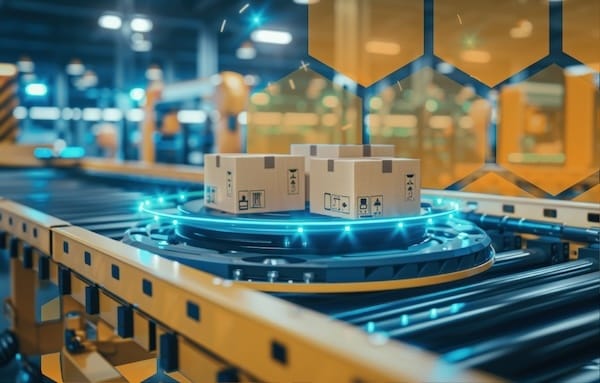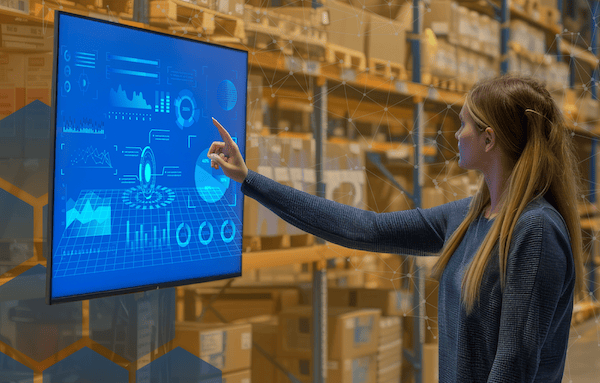- Warehouse Wisdom. Weekly.
- Posts
- Warehouse Wisdom. Weekly. 05/16/2025
Warehouse Wisdom. Weekly. 05/16/2025
Only the most relevant news for SMBs to improve logistics – picked, packed, and delivered without the bias.

Happy Friday!
A new report has confirmed what everyone who's ever missed lunch during peak season already knew: logistics workers have the highest burnout risk of any industry. That’s right, our reward for keeping the global economy humming is a front-row seat to chronic stress. Between ever-evolving tech, labor shortages, and more curveballs than a minor league pitcher, it seems like the only thing moving faster than freight is worker fatigue.
But don't worry, we're not here to depress you. So, in addition to news about everyone’s favorite workplace hazard (burnout), we’re covering tariff pauses that may or may not stick, Suez Canal discounts that feel oddly like coupons for an escape room, Amazon and FedEx deciding they can, in fact, sit at the same lunch table, DHL’s robot takeover (peaceful... for now), online grocery sales going vertical, and more. Let’s unpack the week.
Global Logsitics
The global trade roller coaster continues

First up, the U.S. and China are waltzing again—at least when it comes to tariffs. Following a pause on new import duties, container bookings from China to the U.S. shot up a modest 377%. That’s not a typo, but it does sound suspiciously like panic-buying with a trade policy twist. Nothing motivates logistics like the looming threat of tariffs returning faster than you can say “section 301.”
Meanwhile, the House is mulling a universal ban on the de minimis threshold, which has historically let small parcels skip duties and taxes.
Canada has turned down the tariff heat too, reducing new duties on U.S. goods to "nearly zero"—a level most supply chain professionals would like their inboxes and stress levels to emulate. While this doesn’t quite qualify as a red-carpet welcome for U.S. imports, it’s certainly a more polite shrug than we’re used to seeing in international trade.
However, Canada Post has decided to pause contract talks with workers as negotiations sputter. With little progress made and a strike still looming, the pause gives everyone time to reflect, recalibrate, and possibly remember where they left that emergency continuity plan from the last labor disruption.
On the international waterway front, the Suez Canal is running a flash sale. To lure ships back through the Red Sea—despite a few minor details like piracy and geopolitical instability—they’re offering a 15% discount. Bargain-hunters, rejoice: you can now save big and still get a bonus dose of regional volatility. It's like Black Friday, but for global shipping routes.
And finally, Temu is doubling down on direct-from-China shipments. Taking full advantage of the tariff pause and ongoing changes to customs laws, the company is scaling up its volume to the U.S. This may not thrill domestic competitors, but for now, it's business as usual: cheap, fast, and delivered with a side of geopolitical ambiguity.
Learn AI in 5 minutes a day
What’s the secret to staying ahead of the curve in the world of AI? Information. Luckily, you can join 1,000,000+ early adopters reading The Rundown AI — the free newsletter that makes you smarter on AI with just a 5-minute read per day.
Parcel Freight and Shipping
Reunions, rate hikes, and preemtive panic fees

In a move that might make 2019 Jeff Bezos do a double take, Amazon has enlisted FedEx to handle big-and-bulky residential deliveries. Yes, the same FedEx that famously broke up with Amazon is now back in the picture, proving that in logistics, as in soap operas, no relationship is ever truly over. The collaboration covers oversized items like furniture and TVs.
Meanwhile, over at USPS, your summer mail won’t just be slower, it’ll be pricier too. Starting in July, the Postal Service is rolling out rate hikes across Ground Advantage and Priority Mail services. The official reason? Inflation and operational costs. The unofficial reason? Probably because they can. Just in time for peak vacation season, you’ll be paying more to ship a beach towel than to actually sit on one.
And in the latest “just in case” surcharge news, UPS is prepping a US-to-Canada delivery fee ahead of a potential Canada Post strike.
Logistics Vitals
Salaries rise and satisfaction climbs in logistics jobs

Logistics salaries are finally rebounding, offering a small but welcome sign that the industry hasn’t entirely forgotten how to reward stress, skill, and surviving peak season with only minor emotional damage.
Median salary across all logistics roles rose to 17%, up to $159,252 for executives.
74% of respondents reported receiving a salary increase in the past 12 months.
91% said they were “very satisfied” with their compensation and job.
68% said their functions increased over the last three years.
Warehouse Tech
Robots take the wheel, the pallet, and possibly your job

DHL has decided that enough is enough when it comes to manually unloading containers and is putting robots on the case—1,000 of them, to be exact. The company is investing heavily in autonomous container-unloading robots, presumably because humans were getting tired of playing Tetris with 60-pound boxes in 100-degree trailers. The bots promise to boost efficiency and reduce injuries, though morale may dip slightly once someone realizes the robot doesn’t need coffee breaks.
Meanwhile, Texas is throwing a wrench in the autonomous truck dream by proposing that—brace yourself—humans should still be in the cab. A new bill would require human operators for driverless trucks over 10,000 pounds, which is basically all of them. The Teamsters are backing the legislation, citing safety, jobs, and that tiny voice in your head that says maybe, just maybe, we shouldn’t hand 40 tons of freight over to a software update just yet.
And in the broader warehouse world, robots are quietly multiplying while human hiring might not. New reports suggest that Amazon's latest robotic deployments could significantly reduce the need for manual labor in warehouses, a trend warmly described as “flattening the curve” of hiring. It's a gentle way of saying: if your job involves lifting, scanning, or walking 15 miles a shift, a robot might soon be doing it more efficiently.
Marketplaces
Online grocery sales rise and retail goes high tech

Online grocery sales jumped 15% in April, which suggests either consumers are getting more comfortable with digital carts or we’ve finally given up on remembering where the peanut butter is in-store. Delivery led the growth, because lugging a week’s worth of groceries from your trunk is apparently less appealing than paying someone else to do it in the rain. Instacart and similar services are clearly thriving, and so is the art of tip-guessing.
In the rapidly accelerating world of AI, OpenAI has pulled far ahead of the pack, leaving Google trailing at a “still figuring it out” second. Businesses are gravitating toward OpenAI's tools for their versatility and performance. As AI continues to embed itself across supply chains, expect your inbox and your WMS to get eerily smarter and more passive-aggressive.
eBay, not to be outdone, has launched its own “agentic AI” to enhance customer personalization. The idea is to give users more tailored shopping experiences. Personalization is the name of the game, and eBay’s playing it with algorithms and a very determined digital concierge.
Walmart is also stepping into the future with its new next-gen supercenter, which promises a fusion of tech, convenience, and whatever magic keeps their rotisserie chickens perpetually stocked. These upgraded stores focus on experiential retail—think improved signage, digital touchpoints, and layout enhancements that may finally prevent customers from wandering into automotive while looking for almond milk.
Despite all the AI bells and techy whistles, 85% of retailers still say brick-and-mortar is their primary growth focus. Apparently, the store is far from dead—just getting a facelift, a few self-checkouts, and hopefully a better soundtrack. In-person browsing remains a key sales driver, which makes sense when you realize most people still like seeing the thing they’re buying… or just need an excuse to get out of the house.
Warehouse Quick Deliveries
Walmart’s booming, Hapag’s surging, and small businesses think the sky is falling…
Inflation slows but the tariff impact remains to be seen.
Hapag-Lloyd reports huge volume in last few days.
Walmart U.S. e-commerce sales jump 21%.
Sell sporting goods? Dick’s is set to acquire Foot Locker.
“We will do our best to keep our prices as low as possible but given the magnitude of the tariffs, we aren’t able to absorb all the pressure given the reality of narrow retail margins.”